Since his visit to the temple of Goddess Nu Wa, King Zhou was so infatuated with her beauty that he could not sleep, eat, or drink as usual, and ignored his numerous consorts in the three palaces and six living royal quarters. His heart was heavy and he was so sad he did not want to talk to anyone. To placate the King, Fei Zhong and You Hun suggested bringing in 100 beauties from each of the four Grand Dukes. The King was pleased and issued an edict about the matter, but thanks to Prime Minister Shang Rong, who advised the King against it, the edict was repealed.
Soon after, King Zhou, rethinking his choice of beauties, was influenced by Fei Zhong and You Hun, who held grudges against Su Hu, the Marquis of Jizhou, for failing to bribe them.
They seized the opportunity for revenge by introducing Su Hu’s daughter, Daji, to the King. Describing her as an “exquisite flower” whose beauty surpassed even that of the Moon Fairy, they enticed the King, who promptly ordered Su Hu to present Daji to the palace. Su Hu, however, refused the order and, after composing a rebellious poem, led his officers back to his country. Infuriated by Su Hu’s defiance, King Zhou dispatched his generals to Jizhou to pass judgment on him, sparking battles that claimed many lives. Eventually, the Mandarin officer Chen-Jhizeng delivered a letter from the supreme minister of the West Grand Dukedom, San Yisheng, advising Su Hu to send Daji to King Zhou. Seeing no alternative, Su Hu agreed and ordered Daji to be escorted to the capital. Su Hu selected three thousand mounted soldiers and five hundred servants, had the carriage decorated, and asked Daji to get in. The journey started and when the group came to Enzhou station, it was already dark. The station officer welcomed them and led them inside so they could rest. When Su Hu asked him to prepare a chamber for Daji to stay in overnight, he was told that the place was haunted. Therefore, Su Hu placed fifty servicewomen in Daji’s room, five hundred servants at her door, and three thousand equestrians camping on the outside. He sat in the candle-lit hall and read a book as he kept watch.
A leopard skin whip was beside his desk for protection. At the third watch announcement, a cold blast of wind suddenly blew on the candle, making the flame flicker off and on. In the rear hall, the servants were screaming, “Demons! Demons!” Su Hu picked up the lamp and his whip and rushed into the rear hall. The wind put out the light and Su Hu had to go back to light it up again. By the time he got into Daji’s chamber, he saw the servants trembling and unable to talk.
Su Hu parted the bed curtains and inquired of Daji, “My dear, did you see any ghosts?” Daji responded, “I was dreaming when I heard the screams. Upon waking, I saw only you entering with the light, but no ghost.” Reassured, Su Hu left for the hall, unaware that the malevolent fox had extracted Daji’s soul and inhabited her body to respond. In truth, Daji was merely a lifeless vessel whose soul had been claimed by the demon.
Commentary
The tale of the fox demon possessing Daji may initially seem mythical or implausible.
However, the author of this book has personally witnessed numerous cases of demonic possession, ranging from mild to severe. Some of these instances occurred in broad daylight, witnessed by fifty to seventy people, where the possessed individuals exhibited extraordinary behavior and intelligence. Those well-versed in mysticism are unfazed by such occurrences. If these experts have confirmed the possession of Daji by the evil fox as unequivocally true, it logically follows that the Invisible has the ability to influence a person’s words, actions, and thoughts, implying that the Divinities hold power over human beings. Furthermore, this suggests that crucial decisions made by national leaders are guided by the will of the Divinities, adhering to a celestial plan orchestrated by the overseeing Spirits.
Understanding this principle allows one to grasp the significance of the story involving Daji’s possession by the demon, ultimately leading to the downfall of the Shang dynasty.
According to the narrative, this was orchestrated by the order of the Goddess Nuwa, who followed the divine will and adhered to the principles of mysticism. The author of “The Investiture of the Gods,” Zu Zhong Lin, demonstrates a clear comprehension of this fundamental principle.
Is it necessary to have another individual like Daji from ancient times to influence global leaders or individuals with power to determine the fate of nations or wars, thus impacting the entire world?
There exist numerous methods, ranging from a hundred to a thousand, to influence the thoughts, actions, and speeches of prominent figures.
If desired, the Divinities can inhabit an individual and manipulate them to carry out any task or action they desire, while ordinary people, unaware of mysticism, may assume these individuals are acting of their own accord. Understanding this point leads to the realization that a celestial plan indeed exists, and humanity is under the strict control of divine forces. However, it’s essential to remember that despite these significant events, individuals still retain their free will in their daily lives.
Related Post
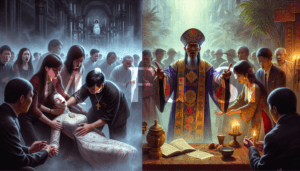
MY AUNT’S SPIRIT POSSESSION
MY AUNT'S SPIRIT POSSESSION (Quỷ nhập- Câu chuyện ôn tập lời dạy của Tổ, Thầy by Bạch Hạc on Wed...

JIANG ZIYA’S MARRIAGE
After showing respect to his master and bidding farewell to his friends, Jiang Ziya departed from the mountain and journeyed...
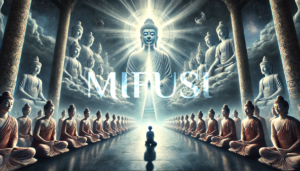
Divine Visions from the Initiation Ceremony
Divine Visions from the Initiation Ceremony These are the 10 Divine acknowledgements during the Initiation Ceremony from various disciples' reports:...
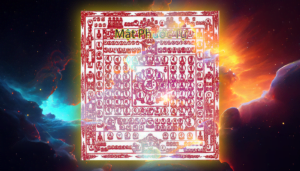
Chapter III: I- Guiding Principles and the Basic Doctrine
The teachings of the Secret Dharma were recorded in many different Sutras. All of them composed the Secret Collection that...
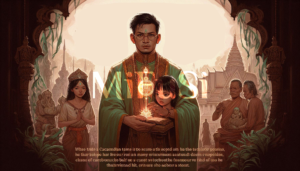
Principles of Exorcism
Principles of Exorcism NGUYÊN LÝ TRỪ TÀ; by Lĩnhnam on Sun Jul 05, 2009 2:20 pm. Presented below is the...

Story 12 – East-West Mystical Encounter
Story 12 -East-West Mystical Encounter Câu chuyện số 12 - Huyền bí Đông và Tây Phương by Hoctro-gia on 12...

Chapter VI: II – Ucchusma Lectures On The Dharani Of Great Satisfaction And Wonderful Magic
II.Ucchusma Lectures On The Dharani Of Great Satisfaction And Wonderful Magic. North India, tripitaka master Ajitasena (the Invincible General) translated...
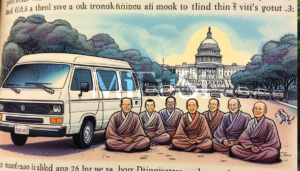
A section from my autobiography- treading the religious path
A section from my autobiography- treading the religious path: About 25 or 26 years ago, I and five other disciples...
